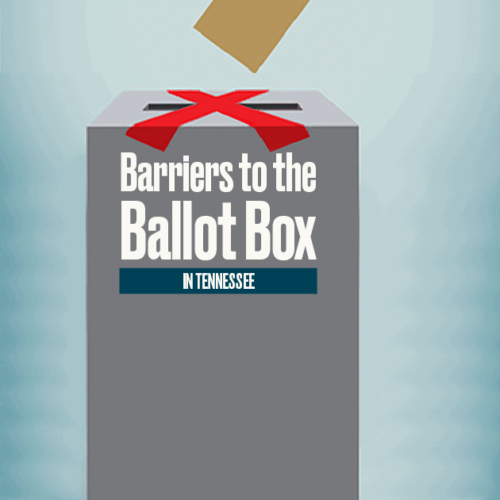Introduction
Legal battles over who gets to cast their ballot by mail in Tennessee have expanded eligibility amid the pandemic. But laws criminalizing voter-outreach efforts and disenfranchising certain residents remain potent barriers.
“Here in Tennessee and throughout the South, I believe lawmakers need to look at access to the ballot box through the lens of, ‘How can we make it easier to vote,’” said Brandon Tucker, policy director at the American Civil Liberties Union of Tennessee.
Instead, he said, “the state has made it more difficult to vote, and the impact is disproportionate. It hurts communities of color more than it hurts white Tennesseans.”
Sign up for The Moment newsletter
Our CEO Susan Smith Richardson guides you through conversations and context on race and inequality.
Here’s a look at some of the most significant updates on restrictions to voting rights and access in the state:
Absentee ballots
Most states started the pandemic with no restrictions on who can cast a ballot by mail rather than in person. Others quickly instituted a similar policy to ensure safe voting that wouldn’t spread the coronavirus.
In Tennessee, it took a legal battle to win more flexibility.
After a judge ruled in June that any eligible voter could use an absentee ballot during the pandemic, the state appealed. Tennessee’s Supreme Court overturned that ruling after the state said it would allow voting by mail for residents who believe COVID-19 poses particular risks for them or people they care for, based on preexisting health conditions.
That doesn’t allow everyone to vote by mail. But it does substantially increase the number of eligible people. In late September, another court ruling clarified that living with someone who has such preexisting health conditions is a sufficient reason to receive an absentee ballot.
First-time voters who registered by mail were, for a time, left out from this expanded pool because they had to vote in person and show an ID. But a September court ruling blocked that requirement.
Still, Tucker is concerned that some eligible voters will be afraid to cast a mail-in ballot. The state recently added a highlighted message to the application form, offering a reward of up to $1,000 for any reports of voter fraud that lead to a conviction.
“I believe [it] seeks to intimidate voters,” he said.
Penalties targeting voter outreach
Tennessee has one of the nation’s lowest voter-registration rates, especially among people of color. After a major voter-registration push in 2018 by groups such as the Tennessee Black Voter Project, the state legislature responded — by making this work harder.
An unusually restrictive state law enacted last year threatened fines and, in some cases, criminal charges for not taking required training or for turning in voter-registration forms with deficiencies. State officials said this was intended to ensure proper registration and prevent fraud, but voter-access groups contend it was meant to constrain registration efforts by scaring those who do this work.
A federal judge blocked the rules after the Lawyers’ Committee for Civil Rights Under Law and others sued. In April, the state repealed the contested requirements.
“We got all of that struck down,” said Ezra Rosenberg, co-director of the Voting Rights Project at the Lawyers’ Committee.
But Tennessee residents who want to help out other voters by sharing application forms for absentee ballots can’t do it. If they’re not an employee of an election commission, that’s a felony. (Creating a request form and sharing that to get around the law is a misdemeanor.)
The Lawyers’ Committee and the Campaign Legal Center are challenging that, too. But there’s little time left to make a difference in this election: The deadline to apply for a ballot is Oct. 27.
Felony disenfranchisement
After the Civil War, Southern states trying to uphold white-only power structures stripped voting rights from people convicted of a felony. By pairing that with aggressive efforts to arrest Black men, states made it a powerful tool of disenfranchisement and white supremacy.
Particularly in recent years, states have been dropping lifetime bans on voting. But the rules in some states, Tennessee included, are effective barriers all the same.
In Tennessee, residents who weren’t convicted of murder or certain other crimes can have their voting rights reinstated — but it’s not automatic, and there’s a catch. First, they must pay all court fees and certain other financial obligations, including child support payments. Even those who can pay often find the process impossible to navigate, The Marshall Project reported in a 2019 investigation.
In 2016, more than 400,000 residents were unable to vote in Tennessee because of felony convictions, including one in every five Black residents, according to a report by the Sentencing Project.
“What we’re seeing is so few people engaging in the process,” Tucker said. “It’s so burdensome, so complicated and meant to be a difficult road to navigate. … It’s a part of this system that is perpetually punishing individuals who have served their time.”
In August, after Black Lives Matter demonstrations, Tennessee enacted a law that makes it a felony to participate in certain protest actions, including camping out on state property. Now, residents demonstrating for their rights could be cut off from the ballot box, the Lawyers’ Committee said.
Read more in Money and Democracy
US Polling Places
In Michigan, fear that mail will drive voting inequality
Barriers remain even after a constitutional amendment expanding voting rights.
US Polling Places
Court battles test Arizona’s long history of voter suppression
Republican restrictions affect Latino and Native American voters after the Supreme Court’s weakening of the Voting Rights Act.


Join the conversation
Show Comments